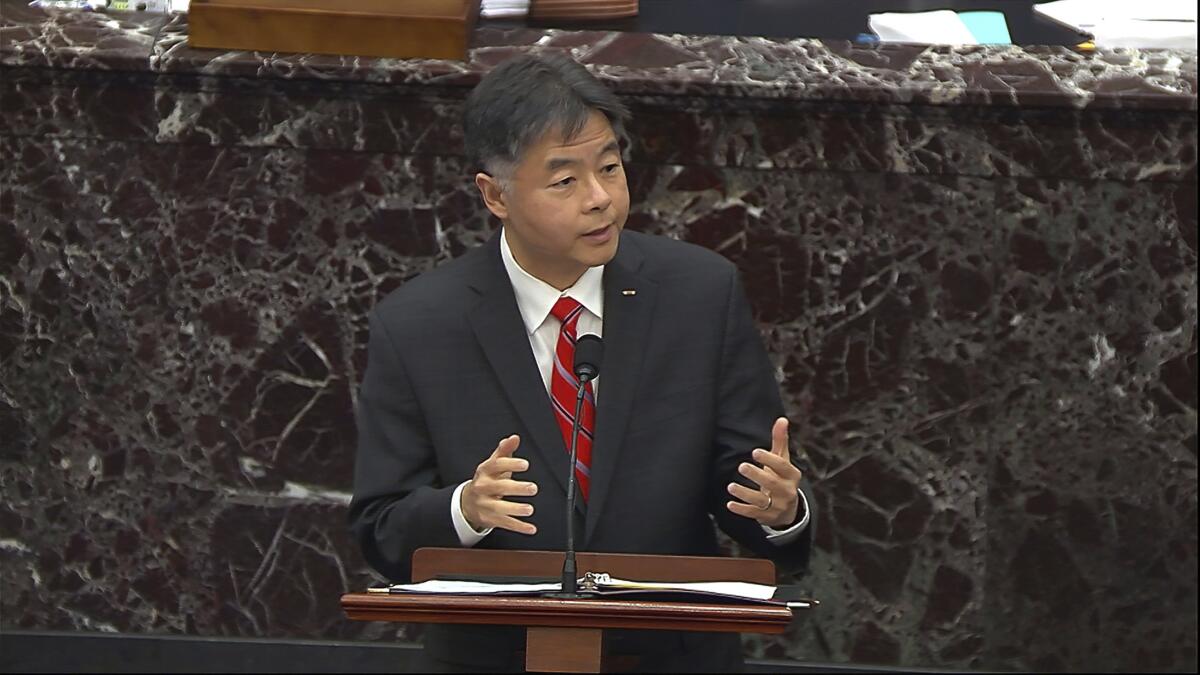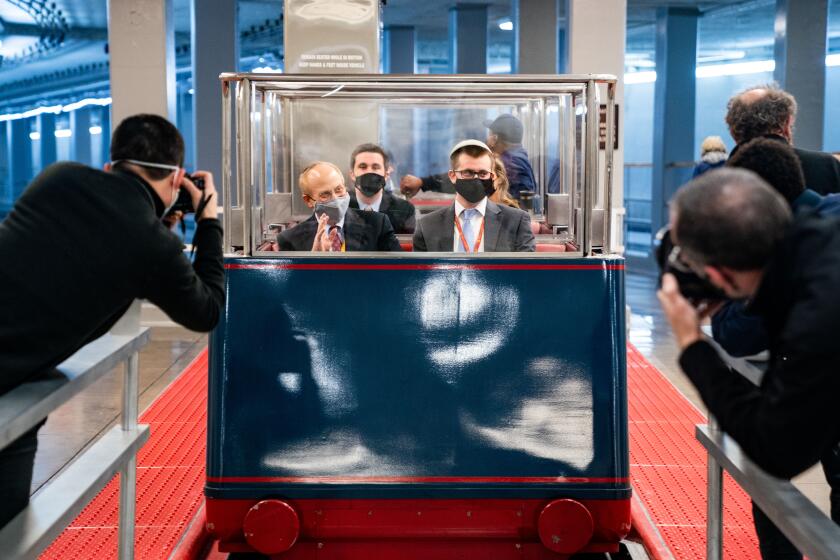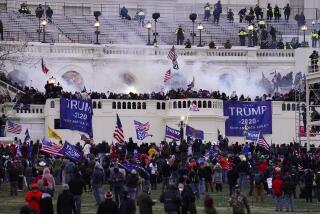Impeachment managers wrap up their case, but was it enough?

- Share via
WASHINGTON — House prosecutors wrapped up their case against former President Trump on Thursday, arguing that he willfully provoked violence by rioters at the Capitol on Jan. 6, and warning that if he isn’t held accountable, he could try to use a mob to regain power.
“Is there any political leader in this room who believes that if he is ever allowed by the Senate to get back into the Oval Office, Donald Trump would stop inciting violence to get his way?” said Rep. Jamie Raskin (D-Md.), the lead House impeachment manager. “Would you bet the lives of more police officers on that? Would you bet the safety of your family on that? Would you bet the future of your democracy on that?”
Closing the prosecution’s case, Raskin posed a series of questions he said senators should think about as the former president’s defense begins its presentation Friday: Why did Trump do nothing to stop the attack? Why did he do nothing to send help to police? Why did he never condemn the violence the day of the riot?
House prosecutors wrapped up their case against former President Trump on Thursday, arguing that rioters on Jan. 6. thought they were acting on Trump’s orders.
His words capped roughly 10 hours of often emotionally wrenching presentations by the impeachment managers, which combined graphic video and audio recordings of the riot with careful legal arguments that won widespread praise from senators of both parties but do not appear to have swayed a significant number of votes in the evenly divided Senate.
The Constitution requires a vote of two-thirds of senators to convict. That means at least 17 Republicans would need to join all 48 Democrats and the two independents who caucus with them to vote to find Trump guilty. The number of GOP senators open to voting to convict is thought to be less than half that.
Trump’s defense lawyers have argued that the Senate lacks the constitutional authority to try a person who is no longer in office, and the former president’s supporters say Democrats rushed through impeachment because they fear running against him in 2024.
House impeachment manager Rep. Ted Lieu (D-Torrance) countered the political argument Thursday by telling senators he wasn’t “afraid of Donald Trump running again in four years. I’m afraid he’s going to run again and lose — because he can do this again.”
After devoting Wednesday to an emotionally powerful presentation that used previously unseen video to weave senators’ Jan. 6 experiences into a narrative of the attack on the Capitol, the impeachment managers Thursday sought to shore up a challenging part of their prosecution: the lack of direct evidence that Trump intended to spur his supporters to lay siege to the Capitol.
Republicans have pointed to that as a significant weakness in the case.
“I have to compliment the impeachment managers just in terms of their presentation preparation. I thought it was excellent,” said Sen. John Cornyn (R-Texas). But, he said, “I think the real question is what’s on [Trump’s] mind.”
House prosecutors tried to convince Cornyn and his Republican colleagues that they can infer intent in Trump’s tweets and public comments in the weeks and hours leading up to the assault. They focused particular attention on his remarks at a rally outside the White House on Jan. 6 in which he urged supporters to head to the Capitol. They also pointed extensively to a tweet he sent during the attack in which he called Vice President Mike Pence a “coward.”
The managers said such comments clearly inspired the rioters, citing comments by insurrectionists that they acted at the president’s behest.
Trump’s lack of action as the attack dragged on for hours also provides a window into his frame of mind, Rep. Joe Neguse (D-Colo.) said, noting the video Trump posted to Twitter that afternoon in which he repeated false claims that the election had been stolen from him before telling rioters to go home and adding, “We love you. You’re very special.”
“On Jan. 6 he didn’t condemn the attack, he didn’t condemn the attackers, he didn’t say he was going to send help ... he didn’t react to the violence with shock and dismay and horror as we did,” Neguse said. “He reacted exactly the way someone would if they were delighted.”
Sen. Bill Cassidy of Louisiana, one of the Republicans who appears to be considering a vote for conviction, said he particularly wanted to hear the defense response to that point.
“The president’s inaction in calling out support for the police officers” who were under attack is a major issue on his mind, Cassidy told reporters.
Neguse said senators should convict Trump if they answer yes to three questions: “Was violence foreseeable? Did he encourage violence? Did he act willfully?”
When Trump spoke to the rally on Jan. 6, “he knew that many in that crowd were ready for violence,” Neguse said. “Standing in that powder keg, he lit the match.”
Raskin used the final day of the case to urge senators to “use our common sense” in examining the evidence. They should look at Trump’s “unavoidable knowledge of the consequences of his incitement and the clear foreseeability of the violent harm he unleashed on our people and our republic.”
Trump had a history of praising supporters who acted violently, Raskin noted, referring to behavior as long ago as 2015, when he cheered on violence at campaign rallies.
“These tactics were road-tested,” Raskin said. “Jan. 6 was a culmination of the president’s actions, not an aberration from them.”
The House prosecutors also addressed the 1st Amendment defense that Trump’s lawyers extensively advanced in their pretrial brief.
“To hear his lawyers tell it, he was just some guy at a rally expressing unpopular opinions. They would have you believe that this whole impeachment is because he said things that one may disagree with. Really?” Neguse said.
“It’s about his refusal to accept the outcome of the election and his decision to incite an insurrection. There’s no serious argument that the 1st Amendment protects that. And it would be extraordinarily dangerous for the U.S. Senate to conclude otherwise.”
Lieu responded to the argument Trump’s defenders have made that the House impeachment proceedings denied the former president due process.
Critics say that some questions might have been answered, and some holes in the case filled, had more time been allowed for investigation.
But Lieu said the House had good reason to move quickly. “The president was still in office” and “rumors of further violence” were rampant in the country.
Trump created an emergency and cannot now complain that the House moved quickly to address it, he said.
Starting Friday, Trump’s lawyers will have up to 16 hours over two days to make their argument. They said Thursday, however, that they may complete their arguments in as little as three hours.
The defense team is likely to continue to emphasize that Trump’s words were protected speech and that the Senate has no authority under the Constitution to punish a former president no longer in office. A Senate majority rejected that assertion, but 44 Republicans voted against proceeding to trial based on such reasoning. And though Raskin argued Thursday that the issue is resolved, many senators continue to cite it as the main reason not to convict.
“I think the whole proceeding’s unconstitutional. I don’t think you have jurisdiction here,” one of those Republicans, Sen. Josh Hawley of Missouri, told reporters Thursday. “Nothing that they have presented has, frankly, addressed that question in a way that I find persuasive or changed my mind on it.”
The lawyers are also expected to stress that no one thinks that the riot is acceptable. But the fault, they say, lies with the rioters, not with Trump.
“They haven’t in any way tied it to Donald Trump,” defense attorney David Schoen told reporters. “And I think it’s offensive, quite frankly; it’s the antithesis of the healing process to continue to show the tragedy that happened here that Donald Trump has condemned, and I think it tears at the American people.”
More to Read
Get the L.A. Times Politics newsletter
Deeply reported insights into legislation, politics and policy from Sacramento, Washington and beyond. In your inbox twice per week.
You may occasionally receive promotional content from the Los Angeles Times.













